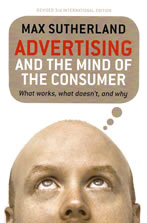![]() Receive new posting via RSS feed. >Click the icon on the left to subscribe.
Receive new posting via RSS feed. >Click the icon on the left to subscribe.
(Or right click the icon to copy and paste the link into your rss reader)
 Why Willpower Wanes: The Tussle of the Muscle
Why Willpower Wanes: The Tussle of the Muscle
By Max Sutherland
Marketing is now increasingly called on to try to moderate consumption - to turn people off, instead of on. But, when consumers are persuaded to exercise restraint, resolve tires easily like a muscle… unless it can be built-up beforehand.
A 2009 paper in the journal ‘Observer’ provides an important notch in our understanding of why willpower weakens.1 This new slant casts willpower as a muscle that, without time for recovery, weakens as we use it.
It is a curious idea but one that is surprisingly well supported by numerous studies and it helps to explain a number of things … like:
- Why so many people who quit smoking, gain weight. The willpower effort in one area (to resist overeating) is sapped by the effort expended in the other (to stop smoking).
- Why the daily effort of sticking to a diet can make us prey to impulse purchasing of other (non-food) items. Again, the effort expended in one area is depleted by the effort in the other.
 Willpower it seems is like one big, mental muscle whose strength is all too easily depleted.
Willpower it seems is like one big, mental muscle whose strength is all too easily depleted.
If you think that sounds a bit far-fetched, then welcome to the club. Yet at the same time it is getting very hard to ignore the numerous studies that now support this… and the diverse ways that our willpower seems to be affected.
The Evidence
Consider some of the curious studies demonstrating the diversity of this effect. In one type of study, hungry participants are exposed to, but have to restrain themselves from eating, tempting food (such as freshly baked cookies). Subsequently, they are given a task such as a puzzle (one that is in fact impossible to solve) and the length of time that they hang in there with the task proves to be significantly less than a control group that has been freely allowed to indulge. In other words, resisting earlier temptation depletes your overall resources; it weakens your resolve and makes you give up faster.
This isn’t restricted to giving up on puzzles and nor is it necessary to have people restrain their hunger in order to unveil the weakening effect. Even applying a simple constraint on thought will do it. Another study type asks subjects to suppress all thoughts of some thing (such as a white bear) for 5 minutes. Afterwards, these people then give up more easily in a variety of challenging tasks, (including a strenuous handgrip task). No…really… they do!
Implications
All this experimental evidence shows how easily willpower is depleted and how we need to think ahead in order to take account of things that may weaken our resolve. As an example, if tonight, at an event you don’t want to drink too much, you need to recognize beforehand that it is not a good idea to expose yourself to other temptations like window shopping on the way to the event.
There are numerous other implications. For example, resist rebuking your kids when they are arguing at breakfast and that restraint effort on your part is likely to make it tougher for you to resist eating that one last pancake. Refrain from blowing up at your boss during the day and you may have less willpower left over to resist eating a tempting, fatty meal at dinner.
The behavior of the polls makes us wonder if this muscle idea applies also to social willpower. For example, the restraint required to grapple with the global financial crisis seems to erode the popular support in the polls for actions to restrain CO2 emissions.
Building Muscle Strength
This ‘limited muscle strength’ idea raises a lot of yet-to-be-answered questions including the speculation that if willpower is truly like a muscle, could it perhaps be strengthened by work-outs that build muscle strength? Could ‘work outs’ with restraint-tasks gradually build willpower, strengthening it long term?
At a society level… who knows? But at an individual level, this muscle analogy makes willpower-training seem more credible. Willpower developmenet programs are helped in their credibility also by research findings like the following. Amongst the subjects asked to suppress all thoughts of a white bear, some were asked to take part for two weeks beforehand in a regime of self-regulatory exercise (such as working on their posture or controlling their mood). This ‘work out’ group subsequently persisted longer at the strenuous handgrip task.
On the face of it, it looks like practice can help build longer-term capacity. If so, it would mean that before quitting smoking or going on a diet, it would be a good idea to put yourself on a willpower capacity building program before trying to kick smoking or any other ingrained habit. On the societal level though, we can’t put our economy on a capacity building program. So, how do we enhance social willpower? Now, that is a 64 billion dollar question.
Marketing
Advertisers and marketers can’t force people into self-regulatory exercises and can’t make people hungry or forbid them to eat or entice them to refrain from thinking about white bears. Willpower is the province of the individual. But with better knowledge of willpower, organizations and policy makers may be able to design more effective turn-off programs that are more likely to stick.
Programs like Quit and other educational approaches directed at helping people recognize their limitations and better manage their own turn-off strategies, provide something of a model. The question is can marketing use this new knowledge to help people further evolve resolve?
Conclusion
The consequences of our consumption lifestyles make the societal need for moderation increasingly imperative. As a society we must eat less, drink less and exercise more. At the same time we have to address global warming by cutting back on our use of energy and natural resources. We need to reduce waist as well as waste and that will make for quite a tussle. That will place huge demands on social as well as individual willpower. Perhaps an answer to the tussle is in the building of a muscle?
“The mind is just another muscle”. Ted Turner (Founder of CNN and Philanthropist)
Download a PDF copy of "Why Willpower Wanes: The Tussle of the Muscle"
Notes
1. Wargo, E. (2009). "Resisting Temptation." Observer (Association for Psychological Research) 22(1): 10-17.


